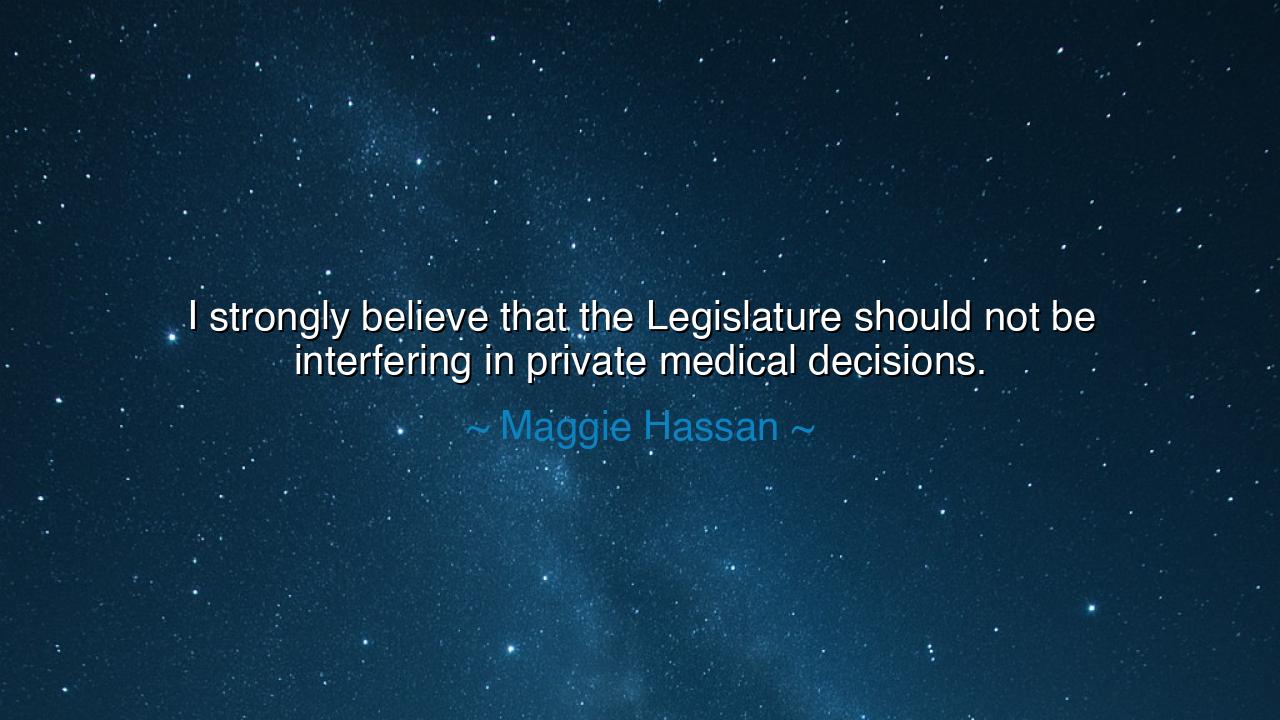
I strongly believe that the Legislature should not be interfering
I strongly believe that the Legislature should not be interfering in private medical decisions.






Hear the words of Maggie Hassan, leader and guardian of civic order, who declares with solemn conviction: “I strongly believe that the Legislature should not be interfering in private medical decisions.” In this simple yet thunderous pronouncement, she reminds us of the sacred boundary between the chambers of government and the chambers of the human heart. For medical decisions are not matters of political debate, but of life and body, of suffering and hope, of private dignity where the individual must be free to choose, guided by knowledge, by conscience, and by the counsel of trusted healers.
The origin of such words lies in the struggles of our age, when lawmakers, driven by ideology or ambition, have often sought to dictate the most intimate of choices. From questions of reproductive rights, to end-of-life care, to treatment access for the gravely ill, legislatures have raised their hands to command what should remain in the sphere of the patient and the physician. Hassan’s voice rises against this encroachment, affirming that freedom is not only political but deeply personal: it extends into the very sanctum of the body, where no lawmaker should intrude.
The ancients themselves understood such a principle, though they spoke of it in other tongues. In the Hippocratic Oath, sworn by physicians of Greece, the healer pledged loyalty to the patient above all else, refusing to harm and respecting the sanctity of choice. The polis might govern laws and armies, but within the space between physician and patient lay a realm untouchable by decree. To break this boundary was to violate the harmony between body, soul, and healer. Hassan’s words echo this ancient covenant, demanding that modern rulers remember what even the ancients revered.
Consider the story of Terri Schiavo in America, whose life and death became entangled in courts, legislatures, and political theater. What should have been a deeply personal decision for her family, guided by medical counsel, was dragged into the glare of public debate, causing pain, division, and years of conflict. This case, etched into memory, stands as a warning of what happens when politics invades medicine, and when lawmakers presume to govern over matters that belong to the heart and the bedside. Hassan’s statement is forged from such lessons: to prevent future tragedies by protecting the sanctity of private medical choices.
The meaning of her words is not merely political but deeply moral. She speaks for the dignity of individuals, for the right to autonomy over their own bodies, for the sacred trust between doctor and patient. When legislatures intrude, they replace compassion with decree, and humanity with bureaucracy. Hassan calls us back to wisdom: that the law must guard freedom, not chain it; that governance must protect dignity, not erase it.
The lesson for us is eternal: freedom is fragile, and it must be defended not only in the streets and parliaments, but also in the quiet spaces of human life—in the hospital room, in the doctor’s office, in the moment when a family decides how to face suffering. We must be vigilant, for each encroachment of politics upon medicine diminishes not only the patient’s freedom, but the dignity of all.
Practical action follows from this truth. As citizens, we must support leaders who uphold the boundary between law and medicine. As communities, we must resist efforts to politicize personal health. As individuals, we must respect the choices of others, even when they differ from our own, for in defending their autonomy, we defend our own. Speak, vote, and act with this principle in mind: that no legislature should govern what belongs to the conscience, the body, and the sacred trust of healing.
Thus, Hassan’s words resound as a teaching for generations. They remind us that true liberty does not end at the ballot box, but extends into the deepest and most private choices of life and death. Let us preserve this liberty with vigilance and courage, for in doing so, we safeguard not only the rights of the living, but the dignity of humanity itself.






AAdministratorAdministrator
Welcome, honored guests. Please leave a comment, we will respond soon